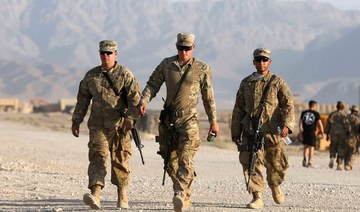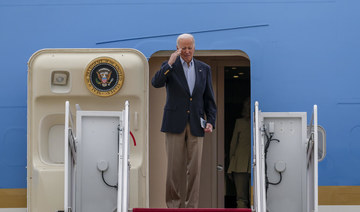BELFAST: US President Joe Biden was welcomed to Northern Ireland by British Prime Minister Rishi Sunak on Tuesday as he flew in for a brief visit to mark the 25th anniversary of a peace deal that largely ended 30 years of bloodshed.
Biden, who is fiercely proud of his Irish heritage, will spend just over half a day in the British-run region before traveling to the Republic of Ireland for almost three days of meetings with officials and distant relatives.
Biden, who was met by Sunak on the runway at a windy Belfast International Airport, arrives at a delicate time in Northern Ireland and will need to tread carefully as the largest pro-British party continues to boycott the devolved power-sharing government, a key part of the 1998 Good Friday Agreement.
The president spoke for a few minutes to officials on the tarmac, flanked by Joseph Kennedy III, of the storied Irish American political family, whom he appointed as the US special envoy to Northern Ireland for economic affairs in December.
Biden and Sunak will hold a meeting early on Wednesday, and Biden will also engage with each of the leaders of Northern Ireland’s five main political parties ahead of his speech at a Belfast university.
Speaking to reporters before boarding Air Force One, Biden said supporting the recent Windsor Framework deal agreed by the European Union and Britain to ease post-Brexit trade barriers in Northern Ireland was one of his top priorities.
“Make sure the Irish accords and the Windsor Agreement stay in place. Keep the peace. That’s the main thing.” he said. “Keep your fingers crossed.”
Northern Ireland’s Democratic Unionist Party (DUP) has said Biden’s visit — the first by a US president in 10 years — will not pressure it to end its protest at post-Brexit trade rules that treat the province differently to the rest of the UK.
The DUP wants further changes to the revised post-Brexit deal for the province but London has said that is not possible.
Biden, who clashed with the British government at times during the Brexit talks, drawing ire from DUP lawmakers, will float the possibility of closer investment ties between the US and Northern Ireland to try to encourage an end to the impasse.
Security concerns were also highlighted on Tuesday by the discovery of four pipe bombs, small improvised explosive devices, in Londonderry, a city 110 km (70 miles) from where Biden is to stay. Police in a statement linked the devices to Irish nationalist rioters who attacked police there on Monday.
’WE DO NEED HELP’
The latest political stalemate — which followed a three-year collapse of the devolved government from 2017 to 2020 — is set to overshadow the visit and the anniversary of the peace deal the US helped broker between Irish nationalists seeking a united Ireland and pro-British unionists wanting to remain part of the UK.
“It might spur things along and maybe things will be taken a bit more seriously,” said Niamh McNutt, a 21-year-old student adviser in Belfast, where security was tight ahead of the visit. “We do need help right now to get things in order and maybe this will give people the push that they need.”
There is still some sporadic violence by small groups opposed to the peace process. In February, an off-duty police officer was seriously injured after he was shot by two gunmen in front of his son.
Britain’s MI5 intelligence agency increased the threat level in Northern Ireland from domestic terrorism to “severe” following the shooting — meaning an attack is highly likely. It has been mostly at that level since its introduction in 2010.
In Ireland, Biden, who speaks proudly of his Irish roots and frequently quotes Irish poets such as Seamus Heaney, will address the parliament in Dublin, meet Prime Minister Leo Varadkar and visit his ancestral homes on either coast.
The president will travel to County Louth on Wednesday, where his great-grandfather James Finnegan was born, and end his visit with a public address in the western county of Mayo, where his great-great-grandfather Edward Blewitt grew up.
“Since (John F.) Kennedy there hasn’t been as Irish American a president as Joe Biden and we’re really looking forward to welcoming him home,” Varadkar said on Sunday.




















